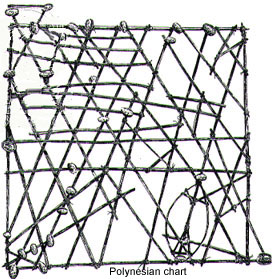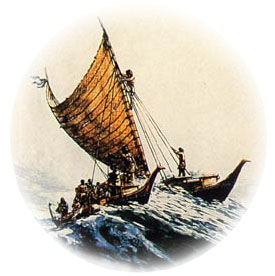A song using the imagery of the mythical great fleet, sung during World War Two to encourage all Maori to work cooperatively in the war effort, and revived during the urban migration of the 1960s.
|
Tōia
mai ngā waka |
Keep
the boats moving everybody Keep pushing on. Aotea, Tainui, Kurahaupo Keep on sailing. Keep the canoes up to speed everbody Keep pushing on. Mataatua, Te Arawa, Takitimu, Tokomaru Keep pushing along. |
"Keep
the cooperative work going |
||||||||||||||||||||||||||||||||||||||||||||||||||||||||||||||||||||||
| Later in the disruptive migration of 1960s, from farms to factories, from small close-knit rural communities to the vast state housing areas of Porirua and Otara, the song was modified to recall the myth of the voyage of the "Great Fleet," to enhance the idea of people from all the tribes being one unified culture, with the strength to withstand urban Pakeha pressures.
Hoe literally means to push away with the hand, and has taken the meaning to paddle or row, and then the meaning of Hoea has broadened further to express voyaging as a crewman in a boat or canoe. Then
Hoea ra was expanded even further as a
metaphor, meaning to work together with maximum effort
in a common and potentially life-threatening task. World War OneThus in 1917 composer Pariare Tomoana, in his song Hoia Ra Te Waka Nei/Come Where Duty Calls, gave the metaphorical meaning of East Coast Maori working together with maximum effort to assist the Ngati Porou soldiers fighting overseas.
World War TwoTaranaki and Waikato Maori, whose ancestors arrived on the Aotea and Tainui waka, had not been keen to help England in World War One, as English soldiers had invaded their settlements and stolen their lands some 60 years beforehand. So in 1943, during World War Two, Hoia Hoia Ra was written to urge Maori people of all tribes, including Aotea and Tainui iwi, to keep the war effort going.
The 1960s Urban Migration
In 1955, for every 100 Maori living on rural marae there
were 33 living in towns.
Literal InterpretationUnfortunately we now live in a non-intellectual age where every story is taken literally. And this version of Hoea Hoea Ra was later used to perpetuate the erroneous belief that seven 20 metre long catamarans traveled to New Zealand together as one fleet. And that they were rowed the entire 5000 kms with paddles! By
1964, when Alan Armstrong featured performance details for
these two songs in his book "Maori Games and Hakas," he gave
this translation.
Of course the ocean wasn't empty - they followed some 100,000 whales and the countless millions of birds that migrated to New Zealand every summer. And they did have charts (grids with shells marking islands, and sticks marking currents and wave directions) and navigational instruments, and they knew the winds and currents well. Primitive canoes? Their sailing craft could go 50% faster than Captain Cook's ship. The replica voyaging waka of recent years have done the journey in under 30 days. However the myth was important in promoting unity among those Maori who were going through a traumatic period of social upheaval, so they could see themselves as a unified cultural group, with the strength to survive urbanisation. And thus Hoia Hoia Ra was modified to strengthen this myth, with this version appearing in the 1960s on a record by the Convairs, a Pakeha folk group.
Then other singers later changed the first line to the now popular "Ngā waka e whitu, e tau nei." The Great
Fleet
|
||||||||||||||||||||||||||||||||||||||||||||||||||||||||||||||||||||||||
| Waka | Chief | Harbour | Descendant Tribes |
| Māmari | Rūānui | Hokianga | Ngapuhi, Te Rarawa, te Aupōuri, Ngati Kahu |
| Ngātoki | Nukutawhiti | Hokianga | Ngapuhi |
| Māhūhū | Rongomai | Kaipara | Ngati Whatua |
| Tainui | Hoturoa | Kawhia | Waikato, Ngati Maniapoto, Ngati Haua, Ngati Maru, Ngati Paoa, Ngati Raukawa, Ngati Toa, Ngaitai |
| Te Arawa | Tamatekapua | Maketu | Te Arawa, Ngati Tuwharetoa |
| Tokomaru | Whata | Mohakatino River | Ngati Tama, Ngati Mutunga, Ngati Rāhiri, Manukorihi, Puketapu, Te Atiawa, Ngati Maru |
| Aotea | Turi | Aotea Harbour | Ngati Ruanui, Ngarauru, Atihau |
| Kurahaupō | Maungaroa or Ruatea | Whangaroa | Taranaki, Atihau, Ngati Apa, Rangitāne, Muaupoko |
| Mātātua | Toroa | Whakatane | Ngati Awa, Tuhoe, Whakatohea, Whanau a Apanui |
| Horouta | Pawa | Waiapu River | Ngati Porou |
| Tohora | Paikea | Gt Mercury Island | Ngati Porou |
| Takitimu | Tamatea | Waiau River | Rongowhakāta, Ngati Kahungunu, Ngaitahu |
Sam Rerekura of Hokianga writes:
"Kupe's high priest who came with him on his canoe "Matahorua" was called Te Papātara. He also made a second trip to the Hokianga with Nukutawhiti on the same canoe, re-adzed and given an extended name Ngatoki-matawhaorua."
The Tune

The song was probably written by Ngati Poneke members, since it was recorded by them in 1951. It has melodic phrases borrowed from the 1940 British wartime song "Bless 'em all," indicating it was written about the same time.
Bless Em All - rangi of Ngā waka e whitu?
Some lines of the tune of Hoea hoea ra are similar to lines in the tune of this popular World War Two song. It was adapted in 1940 by Jimmy Hughes and Frank Lake from a 19th century song of the British Army in India "**** Em All" that came to England in 1916 and was sung by the Royal Naval Air Service and then the Royal Air Force.(Mudcat Cafe)
Bless all the sergeants and W.O. Ones
Bless all the corp'rals and their blinking sons
For we're saying good-bye to them all
As back to the barracks we crawl
You'll get no promotion this side of the ocean
So cheer up my lads, Bless 'em all.There was also a Kiwi soldiers'version
Oh they say there's a troopship just leaving Fiji
Bound for New Zealand's shore.
Heavily laden with time-expired men,
Bound for the land they adore.
There's many a soldier just finishing his time,
There's many a mug signing on,
You'll get no promotion this side of the ocean,
So cheer up, my lads, **** 'em all.
CHORUS: **** 'em all, - **** 'em all.
The long and the short and the tall,
**** all the sergeants and WO1's,
**** all the corporals and their ****ing sons,
For we're saying goodbye to them all,
As up the cook's backside they crawl,
You'll get no promotion this side of the ocean,
So cheer up my lads, **** them all.Page published on web April 2006.
modified for narrow screens, Nov 2021

